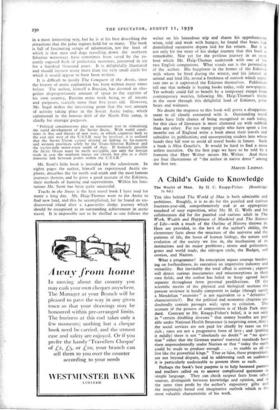A Child's Guide to Knowledge
THE idea behind The World of Man is both admirable and ambitious. Roughly, it is to do for the puzzled and curious fourteen-year-old, comprehensively and at an appropriate standard of easy exposition, what Mr. H. G. Wells and his collaborators did for the puzzled and curious adult in The Work, Wealth and Happiness of Mankind and The Science of Life—with a touch of the Outline of History thrown in. Here are provided, to the best of the author's ability, the elementary facts about the structure of the universe and the patterns of life, the bases of human biology, the nature and evolution of the society we live in, the mechanism of its institutions and its major problems ; atoms and policemen, genes and world trade, the nitrogen cycle, the Budget, soil erosion, and Nazism.
What a programme! Its conception argues courage border- ing on foolhardiness, its execution an impressive industry and versatility. But inevitably the total effect is uneven ; experts will detect curious inaccuracies and misconceptions in their own fields, and the author has failed to keep agreed facts separate throughout from personal predilections. Of the scientific merits of the physical and biological sections the present reviewer is hardly competent to judge (though surely a Mendelian " recessive " is not equivalent to a " defective " characteristic?). But the political and economic chapters un- doubtedly contain passages wide open to criticism. The account of the process of competition is of Hyde Park stan- dard. Contrary to Mr. Knapp-Fisher's belief, it is not only in "certain disabling diseases" that money benefits are pay- able under National Health Insurance (a surprising error, this); the social services are not paid for chiefly by taxes on the rich ; rates are not a progressive form of levy ; and (putting it mildly) there is not "absolutely no doubt" or "no ques- tion" either that the German masses' material standards have risen unprecedentedly under Nazism or that "today the earth could be made to produce enough . . . . to enable us all to live like the proverbial kings." True or false, these propositions are not beyond dispute, and in addressing such an audience it is particularly undesirable to present them as such.
Perhaps the book's best purpose is to help harassed parents and teachers called on to answer complicated questions in simple language. They can check suspect facts from other sources, distinguish between knowledge and opinion, and at the same time profit by the author's expository gifts and the inspiringly broad and imaginative outlook which is the most valuable characteristic of his work.








































 Previous page
Previous page